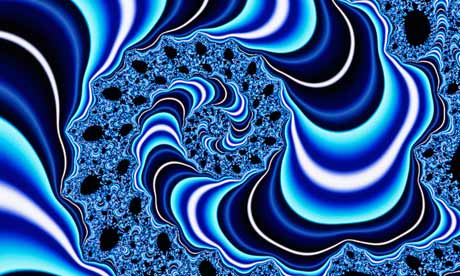
The Operation Julie drug bust in 1977 had an unexpected effect on three police officers, who walked out of a pub and suddenly found themselves under the most brilliant moon they'd ever seen. More than that, their vision seemed so sharpened, they said, that "we could read the print on thrown-away cigarette packets as we passed". They were accidentally tripping from contact with the LSD laboratory and one of them later described it as a profound experience, leading him to discover that life was "a deeper and more subtle business" than he'd previously imagined.
Many people have reported similar revelations in the 70 or so years since the Swiss research chemist Albert Hofmann took his first trip. LSD is a European invention but its history has seemed disproportionately American, hijacked by the preternaturally smiley, snake-oil-salesman figure of Timothy Leary. Andy Roberts redresses the balance in this book – revised and expanded since its first appearance in 2008 – in which the focus is on Britain as a "major crucible of LSD culture". In fact his story is so British that trippers include Sean Connery and Frankie Howerd, both of whom took the drug in LSD therapy.
Just as the early history of LSD in America was bound up with the CIA, so Britain too had secret-state experimentation. Soldiers were dosed with the drug at Porton Down, "hallucinating for Queen and country" after volunteering to test a cure for the common cold (the idea was that LSD might incapacitate enemy troops on the battlefield). Moving on from psychotherapeutic and military uses, Roberts's book soon blossoms into a rich exploration of British counter-culture in the 60s, when, in the words of Barry Miles, "the King's Road led straight to Glastonbury."
The vision of the late John Michell, Stonehenge scholar and counter-cultural philosopher, seems to have been substantially acid-inspired, with seminal books such as The View over Atlantis feeding into a zeitgeist of flying saucers over Albion. Outer space and inner space were coming together as never before, and the UFO nightclub on the Tottenham Court Road in central London, scene of early Pink Floyd gigs, was named both for "Unidentified Flying Object" and "Unlimited Freak Out". When you went to UFO, says one of its founders, "the grinning crocodile of psychedelics wrapped its lips around your ankle, dragged you in and licked you all over." The broader cultural fallout from LSD included the popularity of tie-dye fabrics and macrobiotics. Roberts even links the rise of organic food to the psychedelic movement, and particularly to the Sams brothers, Greg and Craig, originally from America. "The natural foods industry was largely founded by people who experimented with LSD," says Greg, who founded Ceres restaurant in 1969 and apparently invented the veggieburger, while Craig went on to found Green & Black's chocolate.
Roberts also looks at LSD's connection to free festivals and squatting, both the subject of major crackdowns. The fact that LSD has been associated with certain lifestyles seems to play a larger than acknowledged role in its unacceptability to the powers that be. Certainly the magnitude of the Operation Julie case, on both sides, could be called political in a larger sense of the word. One of the guilty parties, aiming at little less than psychic revolution, was caught with a staggering 13m doses, and the police operation was one of the largest mounted in Britain, with 800 officers swooping to cut phone lines and smash down doors. "Ah," said one of the conspirators, "I expect you've come about the television licence."
Roberts doesn't shirk the serious issue of "acid casualties", the small but significant minority of people who develop serious mental illness, and whose plight underpins the official justification for making LSD such a thoroughly illegal drug. We meet Syd Barrett sitting cross-legged on a lawn in 1965, cradling a plum, an orange, and a matchbox. "From time to time he would smile at them in a friendly way" – and the rest, tragically, is history. Less well-known casualties include the British rocker Vince Taylor, credited by David Bowie as the inspiration for Ziggy Stardust.
People's experiences under the influence of the drug vary drastically according to their setting and mindset. Jonathan Aitken saw "visions of hell. Continents dripping with blood. Black men fighting brown men, fighting yellow men." Others have reported that "the sound of the sea was a symphony" and "the world was as if newly created … It brought an inner joy … to be part of the miracle of Creation". Aldous Huxley found that LSD, together with Bach's B-minor suite, convinced him that ultimately "the Universe is All Right".
Most of the players in this book are manifestly decent people, from Hoffman onwards. Shortly before his death in 2008 at the age of 102 (he had appeared on stage the year before and apologised for being a little unsteady, saying "I must remind myself that I'm no longer in my 90s"), he wrote: "Alienation from nature … is the greatest tragedy of our materialistic era. It is the causative reason for ecological devastation and climate change. Therefore I attribute the highest importance to consciousness change." Even the judge in the Operation Julie case noted the "excellent characters" of the people involved.
Reading this book, it is hard not to feel that the largest mental health problem – the really crazy thing – is society's attitude to drugs in general and LSD in particular, whereby we love psychedelia and its various luminaries (with a Tate gallery exhibition of psychedelic art, and knighthoods for Paul McCartney and Mick Jagger) while handing out heavy sentences to ideologically motivated chemists, one of whom was given 20 years as recently as 2004. Albion Dreaming is a solid work of well-researched cultural history, and its larger issues make it not just a highly readable book but an important one – two things that don't always go together.

